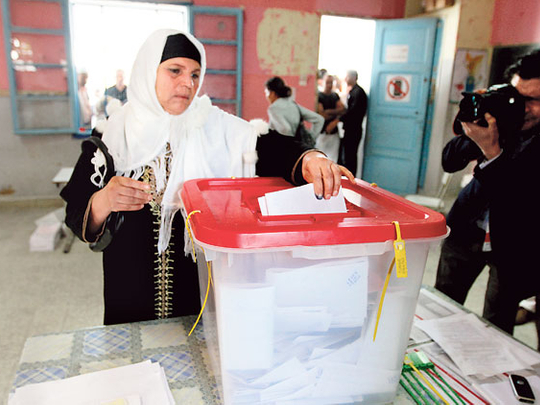
Tunis: Tunisia's polling stations closed at 7pm as scheduled without an extension of the voting times, and in an initial indication of success, no security incident was reported in any of the constituencies.
“Only the people who were inside the voting stations are allowed to cast their ballots after the deadline,” Souad Triki, the deputy head of the Independent Higher Commission for the Elections, said. Voting locales were opened at 7am.
Earlier, Kemal Jendoubi, the head of the commission, expressed satisfaction with the voter turnout for the election of a constituent assembly that will write a new constitution and select an interim president and prime minister.
“It exceeded 80% in some areas two hours and a half before the stations were closed,” he told the media. “The high participation of young men and women denotes a new trust in the elections held in Tunisia,” he said.
Jendoubi said that he expected the announcement of all the results on Tuesday afternoon.
“The ballots cast abroad are still being counted,” he said.
Tunisians living abroad were given three days – Thursday to Saturday – to cast their ballots and elect the 18 deputies who will represent them in the 218-member assembly that will have one year to finalise the draft and choose the president and prime minister.
According to the commission, 15,288 Tunisians cast their ballots in the Arab countries, excluding Syria, Yemen, Jordan and Iraq.
“Turnout in France was between 60 and 70 per cent while it reached 56per cent in Canada,” a commission official said.
Earlier, Tunisians poured out en masse to vote in their first free elections yesterday, basking in their status as democratic trail-blazers nine months after their revolution sparked the Arab Spring.
Islamist party Al Nahda is predicted to win the most votes but could fall short of a majority in a new 217-member assembly that will rewrite the constitution and appoint a caretaker government after decades of autocratic rule. People formed queues before dawn that kept growing outside polling stations in the capital and its suburbs.
"The turnout of Tunisians exceeded all expectations," elections chief Kamel Jendoubi told journalists five hours into voting, adding the final turnout "may exceed 60 per cent".
"We have waited so long for such a day," Yosra Bdiri, a teacher, told Gulf News, adding that she prayed for all the people who died to make the dream of voting freely a reality. Also casting her ballot was the mother of Mohammad Bu Azizi, the man whose self-immolation sparked the uprising in Tunisia and well beyond. "I cast my ballot for the sake of the nation and the freedom martyrs," Manoubia Bu Azizi said.











